

What Is Helicopter Parenting? The term "helicopter parent" was first used in Dr.
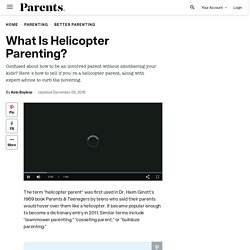
Haim Ginott's 1969 book Parents & Teenagers by teens who said their parents would hover over them like a helicopter. It became popular enough to become a dictionary entry in 2011. Similar terms include "lawnmower parenting," "cosseting parent," or "bulldoze parenting. " Illustration by Caitlin-Marie Miner Ong Helicopter parenting refers to "a style of parents who are overly focused on their children," says Carolyn Daitch, Ph.D., director of the Center for the Treatment of Anxiety Disorders near Detroit and author of Anxiety Disorders: The Go-To Guide. RELATED: Why Helicopter Parenting Is Bad for Your Teen's Health Ann Dunnewold, Ph.
What Is Helicopter Parenting? Here's Why Helicopter Parents Fail Kids in the End. The term "helicopter parenting" comes from the notion that these parents "hover" over their children and then rescue them when needed.
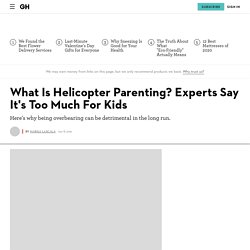
Unlike other parenting styles, helicopter parenting is not a philosophy that parents aspire to or join on purpose; it's a descriptive term used to portray over-involved parents.Helicopter parenting has a few advantages, but mostly results in negative consequences for kids. Helicopter parenting has been a thing for a while — and it's only gotten worse. The term "helicopter parenting" was coined back in 1990 by child development researchers Foster Cline and Jim Fay in their book, Parenting With Love and Logic. "They hover over and then rescue their children whenever trouble arises," the authors wrote at the time. "They're forever running lunches, permission slips, band instruments, and homework assignments to school. " Fast forward almost 30 years and parental over-involvement has only gotten worse. This kind of hovering can look a few different ways.
Helicopter Parenting: From Good Intentions to Poor Outcomes. Do you stand over your child’s shoulder when they do their homework?
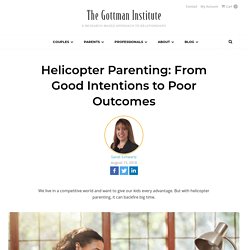
Do you find yourself directing your kids’ every move? “Pick up this, clean up that, sit up straight, finish your homework, study hard, say thank you.” Do you spend a good chunk of your day obsessing about your children’s success, like will they make the sports team or school play, and will they get into the top-notch college you (yes, you!) Always dreamed of? How Helicopter Parenting Can Affect Your Teen's Health. If you tend to hover during your teen's doctor visits, you may be negatively impacting her health, a new study says.
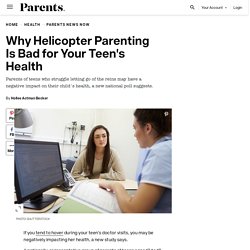
A nationally-representative group of parents of teens ages 13 to 18 were surveyed about their involvement in their teens checkups. The findings? Only 34 percent of parents said their child discussed health concerns privately with a doctor without them in the room, and just 15 percent said their teen would independently share physical or emotional problems with the doctor. Even more startling: Less than 10 percent said their teens could complete their own health history form independently. RELATED: How to Get Teens to Open Up "The majority of parents are managing teens' health care visits, and their teens may be missing out on valuable opportunities to learn how to take ownership of their own health," says Sarah J. C.S. And yet, nearly 40 percent of parents surveryed said that they alone—not their teen—would ask questions about health issues during doctor visits.
Helicopter parents are raising anxious, narcissistic adults. The Age newspaper recently highlighted the issue of so-called "helicopter parenting" at universities.
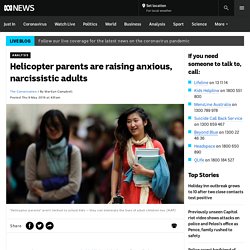
‘Helicopter parenting’ can cause mental health issues, say parenting experts. Experts claim so-called “helicopter parenting” is leading to mental health issues in children in later life.
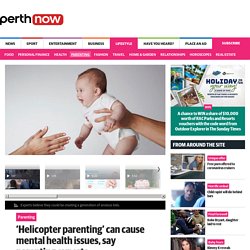
Triple P Positive Parenting Program Professor Matt Sanders said overprotective parents were preventing their children from experiencing failure. As a result, he said some children were becoming afraid or anxious as they grew up. “It’s one of the most common mental health problems that children experience,” Professor Sanders said. Helicopter Parenting: The Consequences. Subscribe to our newsletter and be the first to get the newest updates “How to begin to educate a child.
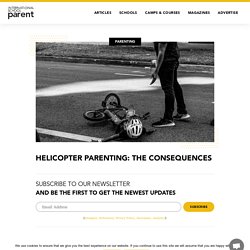
First rule: leave him alone. Second rule: leave him alone. Third rule: leave him alone. What's Wrong With Helicopter Parenting? This generation of parents of young kids has, I think wisely, discovered that being very present as a parent is important to really nurture a child.
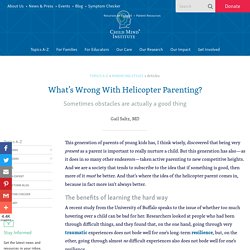
But this generation has also—as it does in so many other endeavors—taken active parenting to new competitive heights. And we are a society that tends to subscribe to the idea that if something is good, then more of it must be better. And that’s where the idea of the helicopter parent comes in, because in fact more isn’t always better.
The benefits of learning the hard way A recent study from the University of Buffalo speaks to the issue of whether too much hovering over a child can be bad for her. Coping and competence Having obstacles to overcome is what helps children to build resilience, to develop coping skills to deal with things that are difficult. Eventually an overprotected child will grow into an adult and face adult problems: “I’m having trouble getting a job.” Strong boundaries Role confusion Make room for mistakes. Child Therapist in Adelaide, Adolescent Psychologists, Parenting Support. Are you finding it difficult to locate a child therapist in Adelaide?
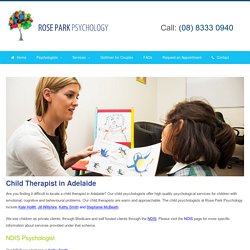
Our child psychologists offer high quality psychological services for children with emotional, cognitive and behavioural problems. Our child therapists are warm and approachable. The child psychologists at Rose Park Psychology include Kate Hollitt, Jill Wiltshire, Kathy Smith and Stephanie McBeath. We see children as private clients, through Medicare and self funded clients through the NDIS. Please visit the NDIS page for more specific information about services provided under that scheme. NDIS Psychologist Our NDIS psychologist is Kathy Smith. Child Psychologist in Adelaide - Westbourne Park Psychology. Therapy for Children with A Child Psychologist A child psychologist talks with parents and assesses a child’s behavioural and mental health problems.
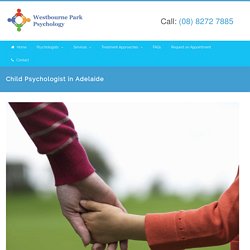
They will assess for and treat, behaviour problems, parenting strategies, children’s emotional problems such as anxiety, sleep disturbance and a wide range of clinical disorders. Parents are – especially with young children – involved in the treatment program. For young children, the parenting component is very important to therapy outcomes. The foundation of all programs is based on: Simon Beal - Child Behaviour Psychologist. Marilyn Campbell. Marilyn is a professor in the school of Early Childhood and Inclusive Education in the Faculty of Education. Her main teaching area is in the Masters of School Guidance and Counselling and in the Masters of Educational and Developmental Psychology. Prior to this appointment Marilyn worked as a teacher for 20 years in early childhood, primary and secondary schools. Stop Think Do - How to order manuals and training materials or contact us.